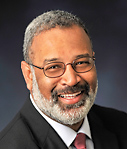Martin Philbert, senior associate dean for research and professor of toxicology in the School of Public Health, has been appointed the new dean of SPH. President Mary Sue Coleman and Provost Phil Hanlon made the announcement Nov. 29, pending approval by the Board of Regents.
The appointment is effective Jan. 1.

Photo by Peter Smith Photography.
In addition to working as senior associate dean for research at SPH since 2004, he also served as interim director of the Center for Risk Science and Communication from 2004-10.
“President Coleman and I are very pleased that Dr. Philbert is assuming this vital leadership role in the School of Public Health,” Hanlon says. “We are confident that he will provide impressive leadership for the School of Public Health, strengthening an already excellent school.”
Philbert came to U-M in 1995 from Rutgers’ Neurotoxicology Laboratories, where he was a research assistant professor. He has maintained a continuously federally funded portfolio of basic research activities throughout his career. Most recently his work has been funded by the National Institutes of Health, the Department of Air Force and the National Cancer Institute.
At the national level, he is recognized for his expertise in neurotoxicology and experimental neuropathology. His work has resulted in two important patents and two patents pending. Philbert is the author of numerous research publications in top peer-reviewed journals, and one book.
“This is a superb School of Public Health,” Philbert says. “I look forward to continuing with my colleagues, the students and staff of SPH on the work of education, scholarship and service so that we can have a positive impact on the health of the public here in Michigan, the Great Lakes region, nationally and globally.
“Together, we will work on difficult issues, develop and share solutions to common problems in public health, and implement common-sense sustainable interventions here and abroad. I look forward to working with the SPH and U-M community to address the persistent and thorny problems affecting the health of human populations everywhere.”
While these are challenging times for public health, Philbert says great access to information on genetics, biology and the environment has opened new avenues for research and practice and posed new challenges.
“We still have much to learn about what makes us susceptible to many diseases and how to effectively manage the long-term consequences of ill health,” he says. “We at the University of Michigan School of Public Health are the ‘Leaders and Best’ in many of the fields of scholarly endeavor that will contribute to a better understanding of these issues and create innovative solutions and policies to address common and persistent problems in public health. I relish the opportunity to promote this work.”
Philbert earned his Bachelor of Science degree in 1984 from the College of Arts and Technology in Cambridge, United Kingdom, and his doctorate from the London University Royal Postgraduate Medical School in London, U.K., in 1987. He was awarded a postdoctoral fellowship in the Neurotoxicology Laboratories at Rutgers University from 1988-90.
In 1995 he joined the faculty at SPH as an assistant professor of toxicology. A promotion to associate professor followed in 2000 and to professor in 2004. He was appointed associate chair for research and development in the Department of Environmental Health Sciences from 2000-03. In his role as senior associate dean for research, Philbert managed a major building and renovation project at SPH, while maintaining oversight of a broad range of administrative responsibilities in the school.
Philbert says today’s public health issues are global and complex, and will require collaboration across the university, with community and academic partners across the world, stakeholders in the community, and public and private decision-makers.
“Our School of Public Health has benefited from a long line of leadership in academic public health that has worked successfully with U-M administration to bring us to our current position of national and international leadership and strength,” he says.
“I look forward to working with our talented and dedicated faculty, staff, students and alumni, with our collaborators across campus, and with our external stakeholders to find new and innovative ways to bridge the divide between scholarly discovery and the widespread adoption of the best public health practices.”

